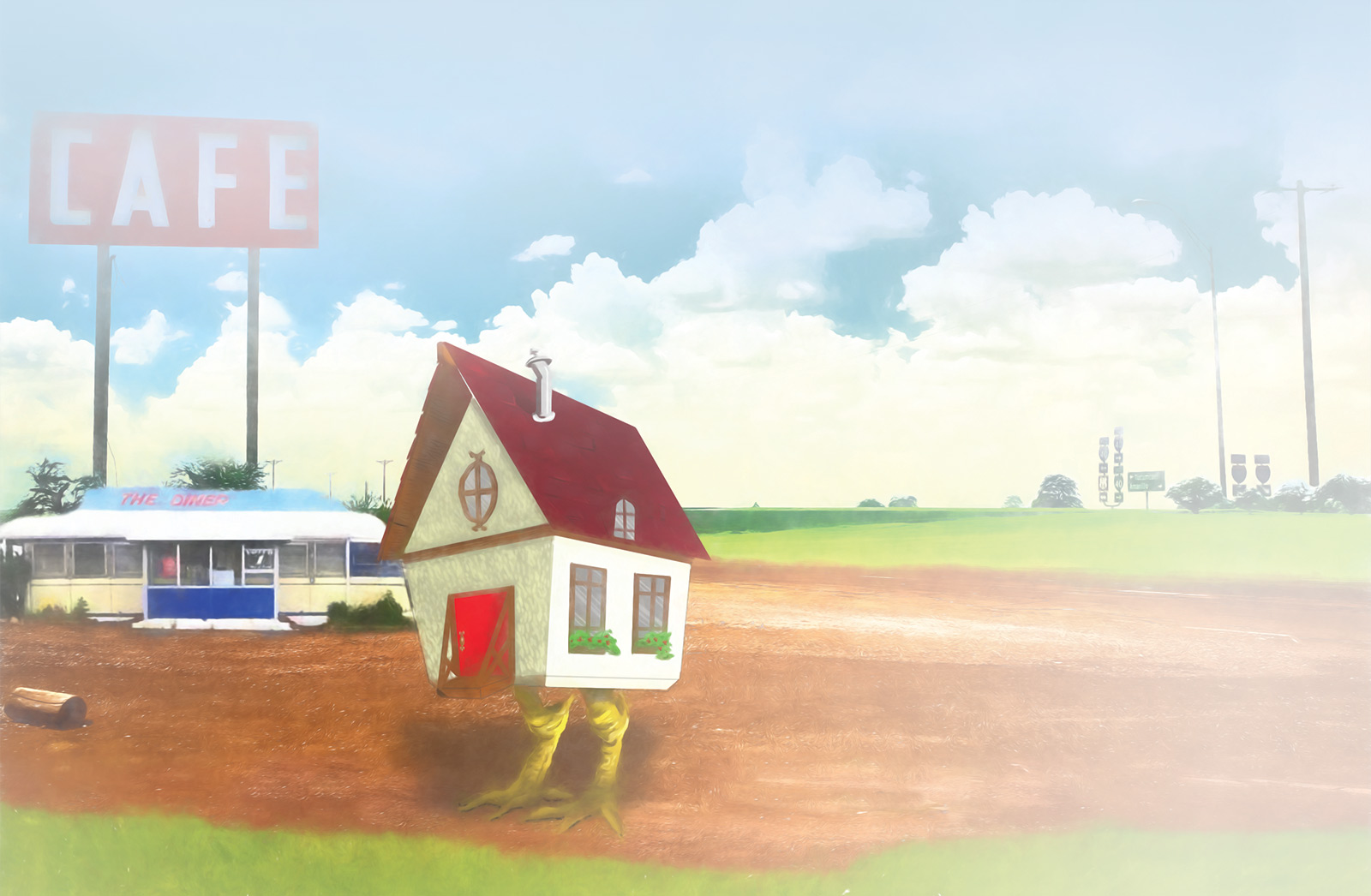When people ask about my mother, it's difficult to explain that she's my house. She's made of wood and glass, and she walks on chicken legs after sunset. She likes yards with tomato plants and dislikes loud dogs. She's been a house for as long as I can remember, and mostly, I don't mind. Except when I try to bring people by. Classmates I’m working on a science project with, or the girl with the pixie cut who makes my heart sigh. They all walk into the house and instantly freeze at the palpable strangeness of it all. My mother makes sure we have popcorn and cans of sparkling water, and she doesn’t interfere except to turn down the music when I play it too loud. I know they try not to notice her there, imposing and everywhere, but eventually they all find excuses to not come over again. I used to cry about it and call my mother awful things. She was understanding. She would sometimes offer to walk to a new school district so I could have a fresh start, but we both knew that wouldn't solve anything. She'd still be herself, square and storied, and I would be me, very human. For my sixteenth birthday, I asked my mother if we could go on a road trip. She’d be able to see new gardens and neighborhoods, and I could visit museums and vintage stores and cafes. She thought about it for a while. I heard her beams groan as she considered the time and distance away from our yard, and at night, I felt her pacing our street with her chicken feet. Finally, as I ate breakfast in our kitchen, she floated me a paper map with our road trip plotted in pink marker. We traveled by night, her walking along highways and country roads, and me watching the streetlights pass from my bedroom until I fell asleep. At dawn, my mother would find a comfortable place to rest, and I would go exploring wherever we were. The people in these places weren’t always pleased with our arrival. I saw scowls and stares as I left each morning, and many asked about the sudden appearance of a two-story home on their street. “What is that?” a woman said as I waited for my latte in a coffee shop. My mother could be seen in the vacant lot across the street. “My mom,” I said. “But like, what is she?” When my mother asked about my day, I didn’t mention those interactions. I told her about the mural I found, or the hummus and vegetable wrap I ate at an outdoor play. But she knew. I could tell by how her curtains fluttered, bright blue and new in honor of our trip. I wanted to tell her those people’s opinions didn’t matter to me, but deep down, I knew they did. I woke up on a Saturday to find we were resting by a roadside diner, surrounded by sky and unending fields of wheat. The next town was too far away to travel to in one night. So I grabbed my bag from the nightstand, told my mother I was headed out, and walked across the sparse parking lot to the neon-lit diner. Inside, linoleum and red pleather gleamed with polish, and I sat in a booth far away from the few other people there. I could see my mother from my window, her panes winking in the morning light. I waved. “What would you like?” A server stood with a pad of paper in one hand. She looked my age, with freckles and glasses and a pair of gold earrings shaped like lightning. I smiled and asked for a cup of coffee and a vegetable omelet. She nodded, but not without another glance out the window. A familiar dread began to crawl up my neck. I wondered what she might say, what I might say, if anyone else would feel the need to comment on the house across the parking lot and the daughter hunched in a diner booth. I felt anger and embarrassment redden by cheeks, and I prepared to lash out when the server returned with my coffee. “Who’s that?” she asked, nodding through the window. I blinked. “My—my mom,” I said. “Cool.” The server slid my cup across the glossy tabletop. “Does she need anything? We can cook up something for take-out if she’d like.” I blinked again. “She’s fine. She doesn’t eat much,” I said, wrapping my fingers around my warm mug. “Is it ok… can she stay there…” The server’s mouth quirked, and my stomach flipped at her smile. “Of course! Just let me or Jerome know if you two need anything.” I ducked my head as she left, staring into my coffee. I barely looked up when my omelet arrived, or when the check slid toward me. After breakfast, I approached the counter register to pay. The server rang up my order, her machine thrumming as she made change and handed me my receipt. “Thanks,” I said, my tongue thick behind my teeth. “It was really…” My gaze drifted back to the window, the server’s following. Her eyes lit up in understanding, and she gave me another smile that warmed me to my core. “My brother is a barn,” she said. “I get it.” “That’s cool,” I said. “Yeah,” she said. “He’s pretty great.” That night, I sat up with my mother as she walked, leaning my head against the front door. I told her I loved her, and through the happy rumbles of her floorboards, she said she loved me, too.  |
 |